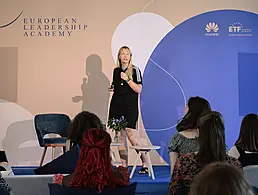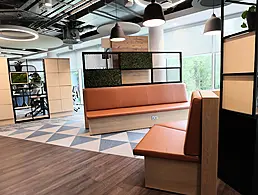Deloitte’s Sinead Gogan discusses how companies can prepare for the future of work and address challenges around remote working, diversity and automation.
Sinead Gogan is chief HR officer and leads the people and purpose team at Deloitte Ireland. She has worked in HR for more than 20 years both internationally and in Ireland.
In a voluntary capacity, she serves as chair of the board for Meath Women’s Refuge and Support Services and is a member of the Irish Management Institute Council. In 2022, she was appointed as an ordinary member to the board of the Workplace Relations Commission.
Gogan told SiliconRepublic.com that the biggest challenges facing the workplace right now are labour and skills shortages.
“Compounded by the ‘great resignation’, these challenges look set to only grow and the talent and education landscape will get even more competitive. Globally, 36pc of millennials and 53pc of Gen Z respondents planned to leave their employers within two years, according to Deloitte 2021 Millennial study,” she said.
“It is this level of disruption that makes change a constant. The opportunity of this will force us to think even more creatively and consider change as continuous, not episodic, allowing us to use it to drive our organisations forward.”
‘In the post-pandemic world, we have seen a huge shift in the worker-employer relationship’
– SINEAD GOGAN
How do you think a more automated future will affect roles in your sector?
Without question technology is changing at an increasing pace for all sectors and professions. Traditionally, HR might have been seen as one of the last bastions of resistance. The attitude has shifted in that AI and bots can help free up time and allow output for HR professionals to be more strategically focused.
AI is already heavily at play in recruitment and onboarding for most organisations, streamlining processes and making applying for a job a more user-friendly experience.
Always-on chatbots as we know have been used in the e-commerce space for years now. They have a place for the instant answering of standard HR queries, are anonymous and great at collating feedback for idea generation, complaints, patterns, etc. However, due to the nature of people queries, it is hard to see a 100pc bot future for a HR service desk that doesn’t require escalation.
Finally, employee engagement surveys and retention strategies can be one of the largest benefactors of the use of AI in HR, with the ability to track and gauge employee sentiment on an ongoing basis.
What new jobs do you think will come to the fore?
In some ways, I think of this as less about jobs and more about capabilities. In general, across all sectors, roles that rely on our innate human characteristics of creativity and judgement will be even more valuable in the future, particularly as we integrate technology.
Data fluency has also become a key competency for all disciplines and is something everyone at every level will have to understand and have the willingness to learn. That aptitude for learning in a world where open source and education resources are available to anyone with an internet connection, makes a growth mindset key.
Finally, the sustainability sector will naturally be hugely important for the macro challenges we have to solve as a community.
How might a hybrid or remote working model affect work-life balance?
In the post-pandemic world, we have seen a huge shift in the worker-employer relationship. Employers were called upon to support workers’ wellness to an unprecedented degree and their success, or failure, has as left a legacy.
Developments that might have played out over a period of many years were compressed into months. Hybrid working is here to stay as everyone has re-evaluated how and where they want to work. The question of how to create flexible, growth-oriented careers integrated with longer and multi-chapter lives, is one of the opportunities of our time and a chance to humanise work for the better of everyone.
Under our hybrid working programme, Deloitte Works, we are trusting our people and giving them the flexibility and choice of when, how and where they work, be it from our clients’ locations, our offices around Ireland, or from home. This control aligned within the context of their team ensures they are in the right place to be collaborative, learn from colleagues, share experiences, deliver a leading client experience, and drive their careers.
We’ve already seen immense increases in salary, particularly in tech. Do you think the future of work will make way for other types of non-salary benefits?
Yes, this reality is already here! Employees have choices in this labour market and companies are innovating with non-salary benefits to make it easy for people to have access to support.
Technology and the pandemic pushed wellness to the top of the business agenda, and it is now a C-suite topic. For employees, of course, these kinds of benefits are personal. The workforce is also multi-generational, so solutions must be designed for life-stage customisation.
At Deloitte, we have continued to invest in our recognition, wellness and paid leave offering to ensure we are competitive, support our purpose and enable our people to never stop growing.
What will companies need to do to attract and support the best talent?
Telling the authentic story of what it is like to work for you goes a long way. Engagingly doing this is likely to work for you before they accept a role, or they will read online review sites.
There is now little difference between your internal and external communications and one must support the other, particularly when you consider the variety of social media channels and marketing options.
Of course, keeping these up to date and relevant is a minimum viable product in this competitive market.
What steps are you taking towards better diversity, inclusion and equality?
Our purpose is to make an impact that matters for our people, our clients, and our communities. Our ambition is for all at Deloitte to be themselves at work, knowing they have the same opportunities to develop and succeed, based on the value they bring as individuals. This is at the heart of our inclusion focus, and it allows us to attract and retain the strongest leadership and team from a range of backgrounds, experiences, and cultures.
Everyone joining Deloitte brings their own unique ‘something’, be it ideas, interests and personality, or a unique worldview – every perspective adds to the culture.
Creating a truly inclusive environment is a core focus, from our grassroots employee networks right to the top of the organisation where our leaders are measured on their inclusion KPIs.
Moving beyond the business case for inclusion means addressing the structural barriers and designing internal systems that disrupt the biases we know arise.
One practical solution we have developed is an Inclusion Passport, a framework for a discussion around a variety of personalised support and ways of working to help our people thrive personally and professionally. It is an opportunity for individuals to negotiate and agree on their individual needs with their people leader once, eliminating any future renegotiations.
What can companies do today to prepare for the work of tomorrow?
I found the Deloitte recent thought leadership on ‘The Great Reimagination’ immensely helpful in thinking about how we prepare for the future. We also know from our employee sentiment and listening that one size certainly does not fit all, especially with a multi-generational workforce.
Employees want to learn and grow in their positions, and more importantly, contribute to areas that are important to them and are aligned to their personal purpose. Reimagining the variety of opportunities through rotation and internal movement, along with redesigning the actual work, are two things that resonate hugely with what our team is seeing and working on every day.
10 things you need to know direct to your inbox every weekday. Sign up for the Daily Brief, Silicon Republic’s digest of essential sci-tech news.




